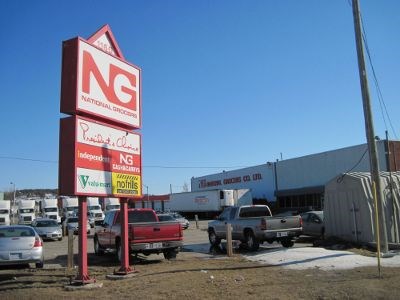The fault lines separating Greater Sudbury Mayor Marianne Matichuk and the rest of city council were exposed again this week when the mayor was the lone vote against proceeding with the new transit garage.
Meeting Jan. 29, councillors approved the $23.5-million project, which will act both as a storage and maintenance facility for the city’s 60 or so transit buses and 900 other vehicles.
Tony Cecutti, the city’s general manager of infrastructure, outlined plans for the new garage, which will combine work being done at six other sites. He said the garage is going into the former National Grocers building on Lorne Street, which the city purchased in 2010 for $4.9 million.
He outlined the garage design, which includes such features as energy-efficient lights, which will save $86,000 a year, and heat recovery, which will use exhaust heat from the vehicles to help heat the building.
It will include 48,000 square feet for bus storage and the same space for the repair garage. The plan calls for removing columns in the Lorne Street building, allowing space to store another 10 transit buses. They’re able to remove the columns because the building is in such good shape, he said.
“Combining fleet and transit under one garage,” offers them the opportunity to operate for hundreds of thousands of dollars less than now, Cecutti said.
While the garage is more expensive than originally forecast to build, taking two years to carefully plan each aspect of the project means Sudburians will get excellent value for the money, he said.
When money already set aside is taken into account, the city will have to raise $17.1 million to finance the garage, leaving them with annual debt payment of $1.2 million.
While it was originally supposed to open in 2012 and early cost estimates were around $15 million, CAO Doug Nadorozny said the original estimate lacked detail and didn’t include costs such as drainage, which will be key to housing a fleet of vehicles covered in salt and snow for parts of the year.
“The more we got into the details,” the more issues crept up, raising costs, Nadorozny said.
However, the cost of the transit garage is still far below the $35-million estimate for replacing all the facilities that will now be housed in the single garage.
Ward 2 Coun. Jacques Barbeau said it’s a project that makes sense for Sudburians on many levels.
“This will be a transit and fleet facility,” Barbeau said. “Rather than send them out to somebody in southern Ontario, we can rebuild the buses here and add five or six years to the life of the vehicles.”
The garage will allow city staff to do more of the mechanical work themselves, saving taxpayer’s money. He said it took two years to “do this right. We’ll have a building that’s not only right for today, but right for tomorrow, as well.
“This is nothing but a positive for the city.”
“We’re doing exactly what the public asked us to do,” said Ward 1 Coun. Joe Cimino.
When council spends money, taxpayers expect them to take the time to do it right, and to move forward with projects that maximize benefits and minimize costs.
“I hope the public really gets informed on what this is about,” he said. “If they do, they’ll be pleased.
Ward 5 Coun. Ron Dupuis agreed.
“We have to make sure that we're going to have a facility that lasts us for decades,” Dupuis said. “And that’s what we have here.”
But Matichuk disagreed, saying she voted against the project because of the escalating costs and the lack of information about other options the city could have pursued.
“I know things in two years can get a little more expensive, but I don’t feel like I got the information I needed,” Matichuk told reporters after the meeting.
“I would think there would be more due diligence than walking through a building and looking at things. If you’re going to put a transit garage in there, you had to know you would need drains for the buses and all that. To have it put in after the fact, really, wasn’t something I could vote (for.)”
She also said having a transit garage with all the bells and whistles is questionable, asking “Do we need the Cadillac?”
What bothers her more than anything is the fact councillors get costs estimates for projects that never seem to hold when actual construction begins.
“Council will vote on something, and then, poof, costs will escalate,” she said.
“I want to know the real costs when I vote on something. I want the due diligence done, so that a year later, we’re not hearing ‘oh we forgot about this,’ or something like that.
“I’m not saying that happened here. But it took a long time, costs are escalating and the public is not happy about it.”
She said there should have been a report looking at the differences in starting from scratch and renovating the National Grocers building.
“I think a cost-benefit analysis should have been done at that time, before that building was even purchased.”
Join Sudbury.com+
- Messages
- Post a Listing
- Your Listings
- Your Profile
- Your Subscriptions
- Your Likes
- Your Business
- Support Local News
- Payment History
Sudbury.com+ members
Already a +member?
Not a +member?
Sign up for a Sudbury.com+ account for instant access to upcoming contests, local offers, auctions and so much more.
